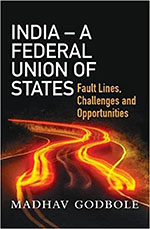In celebrating Azadi ka Amrit Mahotsav, the issue most debated is federalism in its various manifestations. Because of the implicit majoritarian manifestation of the Bharatiya Janata Party, questions are being raised regarding accommodation of and tolerance to opposing political parties in power in different federal units. On the basis of the evolving nature of federalism in India, nomenclatures like ‘quasi’, ‘bargaining’, ‘cooperative’, have been affixed as adjectives to the Indian version of federalism. Madhav Godbole’s book focuses on the origin, i.e., on debates in the Constituent Assembly and associated problems in-built in the federal structure of India. The author zeroes in on the case of Kashmir to unravel how fragile the federal structure is. The author, a seasoned bureaucrat by profession, with first-hand experience in the dynamics of Centre-State policy formulation focuses on the fault lines and provides certain correctives to make federalism more meaningful and mature in India.
Identifying inter-State relations between the rich and the poor States, North-South regional connotations and writing about Jammu and Kashmir as the main problem areas of Indian federalism, the author notes that the situation today is such that going beyond politics, ‘even lack of common civilities and courtesies in interpersonal relations’ (p. xix) are seen in India. Before probing deep into emerging fault lines of Indian federalism, Godbole points out that ‘inter-state water disputes and local self-governing performances’ (p. xxiii) remain outside the mainstream gaze on the problems of federalism in India which only focuses on a strong Centre, relying on erstwhile colonial governance practices, States assisting central planning of the economy, disinclined States to have a larger say in national affairs (p. 19).

